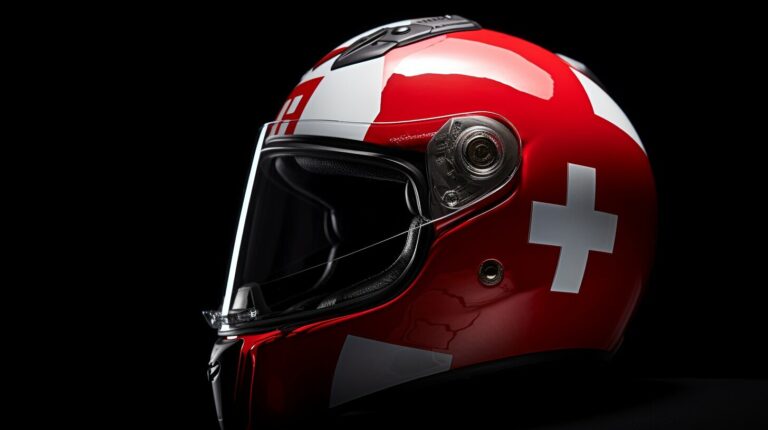Motorcycle helmets are required by law in Switzerland for all riders. As with any country, it is important to understand and comply with the specific regulations and requirements for motorcycle helmets. In Switzerland, helmets must meet the “ECE 22-05” standard to ensure adequate protection. It is also important to note that helmet laws may differ at national borders, so compliance with each country’s regulations is necessary when traveling.
Key Takeaways:
- Helmets are mandatory for all motorcycle riders in Switzerland.
- Helmets must meet the “ECE 22-05” standard.
- Similar helmet requirements are in place across Europe.
- Germany has its own specific regulations for motorcycle helmets.
- Helmets meeting other standards, like DOT or Snell, are not legal in most European countries.
Understanding Swiss Motorcycle Helmet Regulations
Swiss motorcycle helmet regulations stipulate that riders must wear a helmet that complies with the “ECE 22-05” standard. This standard ensures that helmets provide adequate protection and meet the necessary safety requirements. It is mandatory for all motorcyclists and scooter riders in Switzerland to wear a helmet that meets this standard.
In addition to the ECE 22-05 standard, it is important to note that Swiss regulations also require riders to wear a helmet that fits properly and securely. Ill-fitting helmets may not provide adequate protection in the event of an accident. Properly fastening the chinstrap is also a crucial aspect of helmet safety, ensuring that the helmet stays securely in place while riding.
These regulations are in line with similar requirements across Europe. Countries like Belgium, France, Italy, Spain, and the Netherlands also require motorcyclists to wear helmets that comply with the ECE 22-05 standard. However, it is worth noting that Germany has its own unique regulations, which stipulate that helmets must be specially made for motorcycling and offer sufficient protection. Helmets meeting other standards, such as DOT or Snell, are not legal in Europe, except in Germany and Turkey.
| Helmet Standard | Legal in Switzerland | Legal in Germany |
|---|---|---|
| ECE 22-05 | Yes | Yes |
| DOT | No | Yes |
| Snell | No | Yes |
It is important to remember that helmet laws may vary at national borders. When traveling between countries, it is crucial to comply with the regulations of each country you visit. This ensures that you remain compliant with local laws and avoid any potential legal consequences.
By wearing a helmet that meets the necessary safety standards, riders can significantly reduce the risk of head injuries in the event of a motorcycle accident. The helmet acts as a protective barrier, absorbing the impact and minimizing the force applied to the head. Abiding by helmet regulations is not only a legal requirement but also a fundamental aspect of promoting safety on the roads.
Helmet Standards Across Europe
Similar to Switzerland, many European countries have mandatory helmet laws that require riders to wear helmets meeting the ECE 22.05 standard. This standard ensures that the helmet provides adequate protection and meets the necessary safety requirements. Countries like Belgium, France, Italy, Spain, and the Netherlands all have similar regulations in place, making it mandatory for motorcyclists to wear helmets that comply with the ECE 22.05 standard.
Germany, on the other hand, has its own unique regulations regarding motorcycle helmets. In addition to meeting the ECE 22.05 standard, the helmet must be specially made for motorcycling and provide sufficient protection. This means that helmets meeting other standards, such as DOT or Snell, are not legal in Europe, except in Germany and Turkey.
It’s important to note that when traveling across borders, helmet regulations may vary. Therefore, it is crucial to comply with the specific regulations of each country you visit. This can help ensure your safety and avoid any potential penalties for non-compliance. Always take the time to familiarize yourself with the helmet requirements of the country you’re entering to ensure you are following the law and staying protected on the road.
| Country | Helmet Standard |
|---|---|
| Switzerland | ECE 22.05 |
| Belgium | ECE 22.05 |
| France | ECE 22.05 |
| Italy | ECE 22.05 |
| Spain | ECE 22.05 |
| Netherlands | ECE 22.05 |
| Germany | ECE 22.05 + Additional Requirements |
| Turkey | ECE 22.05 + DOT or Snell |
Germany’s Helmet Regulations
Germany has its own helmet regulations, specifying that helmets must be designed specifically for motorcycling and offer adequate protection. When riding a motorcycle or scooter in Germany, it is mandatory to wear a helmet that meets these requirements. This ensures the safety of riders and helps prevent severe injuries in the event of an accident.
Unlike other European countries, Germany does not accept helmets that meet the DOT or Snell standards. Instead, helmets must adhere to Germany’s specific regulations, which include strict guidelines for design and protection. These regulations are in place to ensure that all riders have access to high-quality helmets that provide maximum safety.
It is important for motorcyclists visiting Germany to be aware of these unique regulations and ensure they have a helmet that complies. Failure to do so may result in fines or penalties. To make sure your helmet meets German requirements, look for the “ECE 22-05” certification, which guarantees it meets the necessary standards.
| Countries | Helmet Standard |
|---|---|
| Belgium | ECE 22.05 |
| France | ECE 22.05 |
| Italy | ECE 22.05 |
| Spain | ECE 22.05 |
| Netherlands | ECE 22.05 |
| Germany | Germany-specific regulations |
| Turkey | DOT or Snell |
Summary:
Germany has its own helmet regulations that require helmets to be specifically designed for motorcycling and offer adequate protection. Helmets meeting other standards, such as DOT or Snell, are not legal in Germany or most European countries. It is crucial for riders to understand and follow the helmet regulations of each country they visit, as laws may differ at national borders. To ensure compliance in Germany, look for helmets with the “ECE 22-05” certification, which indicates they meet the necessary standards.
Different Helmet Standards in Europe
It is important to note that helmets conforming to standards other than ECE 22.05, such as DOT or Snell, are not considered legal in most European countries, including Switzerland. This means that if you are planning to ride your motorcycle or scooter in Switzerland, it is crucial to ensure that your helmet meets the ECE 22.05 standard. This standard ensures that the helmet has undergone rigorous testing and provides the necessary protection for riders.
Helmet Standards Comparison
| Helmet Standard | Countries Where it is Legal |
|---|---|
| ECE 22.05 | Switzerland, Belgium, France, Italy, Spain, Netherlands |
| DOT | Germany, Turkey |
| Snell | Germany, Turkey |
As seen in the table above, helmets meeting the DOT or Snell standards are only legal in Germany and Turkey. Therefore, if you are riding in Switzerland and other European countries, it is important to ensure that your helmet meets the ECE 22.05 standard. This will ensure compliance with the local helmet laws and provide you with the necessary protection while riding.
When traveling across borders within Europe, it is essential to be aware of the helmet laws in each country you visit. As mentioned earlier, regulations may vary at national borders. To avoid any legal issues, always make sure your helmet meets the requirements of the country you are entering. This will help ensure a safe and enjoyable riding experience.
Remember, wearing a helmet that meets the required standards is not just a legal obligation but also an important safety measure. Helmets are designed to protect you in the event of an accident and can greatly reduce the risk of serious head injuries. So, always make sure you choose a helmet that meets the necessary standards and fits properly to ensure maximum safety on the road.
Helmet Requirements at National Borders
When traveling across national borders, motorcyclists should ensure they comply with the specific helmet requirements of each country they enter. In Switzerland, helmets are mandatory for motorcycle and scooter riders, and they must adhere to the “ECE 22-05” standard. This requirement is similar across Europe, where wearing a helmet that meets the ECE 22.05 standard is mandatory in countries such as Belgium, France, Italy, Spain, and the Netherlands.
It is essential to note that Germany has its own regulations regarding motorcycle helmets. In Germany, the helmet must be specially made for motorcycling and provide sufficient protection. Interestingly, helmets meeting other standards, such as DOT or Snell, are not legal in Europe, except in Germany and Turkey.
When crossing borders, motorcyclists should be aware that helmet laws may vary from country to country. To ensure compliance, it is crucial to familiarize yourself with the specific regulations of each country you plan to visit. By doing so, you can avoid potential legal issues and ride safely within the boundaries of the law.
| Country | Helmet Requirement |
|---|---|
| Switzerland | ECE 22-05 standard helmet |
| Belgium | ECE 22.05 standard helmet |
| France | ECE 22.05 standard helmet |
| Italy | ECE 22.05 standard helmet |
| Spain | ECE 22.05 standard helmet |
| Netherlands | ECE 22.05 standard helmet |
| Germany | Specialized helmet providing sufficient protection |
| Turkey | Helmets meeting standards such as DOT or Snell |
Ensuring Helmet Compliance
To ensure compliance with Swiss helmet laws, riders should carefully inspect their helmets to ensure they meet the “ECE 22-05” standard. This standard is a requirement in Switzerland and across Europe for the mandatory use of motorcycle helmets. The “ECE 22-05” certification guarantees that the helmet has undergone rigorous testing, ensuring its safety and protection for riders.
When inspecting a helmet for compliance, riders should look for the “ECE 22-05” label or stamp on the chin strap or inner lining. This label indicates that the helmet meets the necessary standards and is approved for use in Switzerland. Additionally, riders should ensure that the helmet fits properly and snugly, providing optimal protection in case of an accident.
It’s also important to note that helmets meeting other standards, such as DOT or Snell, are not legal in Europe, except in Germany and Turkey. Therefore, riders traveling from these countries into Switzerland should ensure their helmets also meet the “ECE 22-05” standard to comply with Swiss regulations.
| Key Points to Ensure Helmet Compliance: |
|---|
| Check for the “ECE 22-05” label or stamp on the helmet |
| Ensure the helmet fits properly and snugly |
| Verify compliance with Swiss regulations when traveling from other countries |
By adhering to the helmet compliance requirements, riders can ensure their safety on the road and avoid potential fines or legal consequences. It’s essential to prioritize safety and comply with the regulations in place to protect oneself and others while enjoying the freedom of riding a motorcycle in Switzerland.
Importance of Wearing a Helmet
Wearing a helmet while riding a motorcycle is crucial for personal safety, reducing the risk of severe injuries or fatalities in the event of an accident. In Switzerland, as well as across Europe, motorcycle safety regulations mandate the use of helmets that comply with the “ECE 22-05” standard. This standard ensures that the helmets meet specific safety requirements, providing adequate protection for riders.
Other countries in Europe, such as Belgium, France, Italy, Spain, and the Netherlands, also enforce the use of helmets meeting the ECE 22.05 standard. However, it is important to note that Germany has its own regulations, requiring helmets that are specially made for motorcycling and offer sufficient protection. Helmets meeting other standards, like DOT or Snell, are not legally accepted in most European countries, except for Germany and Turkey.
When traveling across national borders, it is essential to be aware of the helmet requirements of each country visited. Laws may vary, and non-compliance can result in fines or other consequences. To ensure compliance with Swiss helmet regulations, riders should check for the “ECE 22-05” certification on their helmets.
In summary, wearing a helmet that complies with the appropriate safety standards is not only a legal requirement but also a smart choice. By prioritizing personal safety and following motorcycle safety regulations, riders can mitigate the risks associated with accidents and enjoy their journeys with peace of mind.
| Country | Helmet Standards |
|---|---|
| Switzerland | ECE 22-05 |
| Belgium | ECE 22-05 |
| France | ECE 22-05 |
| Italy | ECE 22-05 |
| Spain | ECE 22-05 |
| Netherlands | ECE 22-05 |
Do Colorado’s Helmet Laws Apply to Switzerland?
Switzerland may seem far from Colorado, but motorcycle helmet laws in colorado do not extend to this European country. Switzerland has its own regulations concerning motorcycle safety, and while helmets are strongly encouraged, they are not mandatory for all riders. So, if you plan on cruising the Swiss Alps on a motorbike, make sure to research the specific motorcycle helmet laws in Switzerland.
Conclusion
In conclusion, motorcycle helmets are required by law in Switzerland, with riders mandated to wear helmets meeting the “ECE 22-05” standard to ensure their safety and comply with regulations.
This requirement aligns with the helmet laws in many European countries, including Belgium, France, Italy, Spain, and the Netherlands, where wearing a helmet that meets the ECE 22.05 standard is also mandatory. However, it is essential to note that Germany has its own unique regulations, specifying that helmets must be specially made for motorcycling and provide sufficient protection.
It is worth mentioning that helmets meeting other standards, such as DOT or Snell, are not legal in Europe, except in Germany and Turkey. Therefore, it is crucial to ensure that your helmet complies with the specific regulations of the country you are visiting, as helmet laws may vary at national borders.
By wearing a helmet that meets the “ECE 22-05” standard, motorcyclists not only adhere to the mandatory helmet use in Switzerland but also prioritize their safety on the road. Wearing a helmet significantly reduces the risk of head injuries and can potentially save lives in the event of an accident. So, remember to always wear a suitable helmet that meets the necessary standards and enjoy your ride responsibly.
FAQ
Q: Are motorcycle helmets required in Switzerland?
A: Yes, helmets are compulsory when riding a motorcycle or scooter in Switzerland. The helmet must comply with the “ECE 22-05” standard.
Q: What helmet standards are mandatory in other European countries?
A: In countries like Belgium, France, Italy, Spain, and the Netherlands, wearing a helmet that meets the ECE 22.05 standard is mandatory. Germany has its own regulations, requiring helmets specially made for motorcycling and providing sufficient protection.
Q: Can I use helmets that meet DOT or Snell standards in Europe?
A: No, helmets meeting other standards, such as DOT or Snell, are not legal in Europe, except in Germany and Turkey.
Q: Do helmet laws vary at national borders?
A: Yes, helmet laws may vary at national borders. It is important to comply with the regulations of each country you visit.
Q: How can I ensure helmet compliance in Switzerland?
A: To ensure compliance with helmet regulations in Switzerland, make sure your helmet has the “ECE 22-05” certification.
Q: Why is wearing a helmet important?
A: Wearing a helmet while riding a motorcycle provides crucial protection in the event of an accident. It significantly reduces the risk of head injuries and can save lives.






